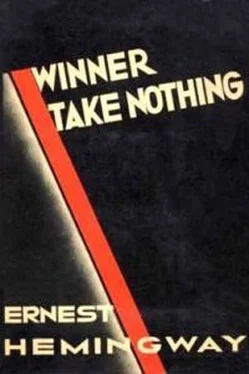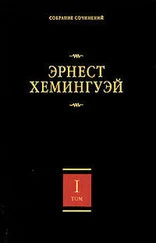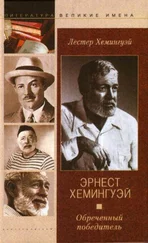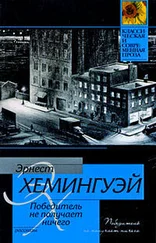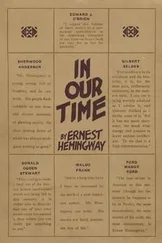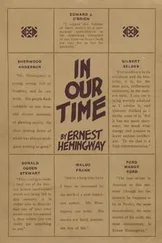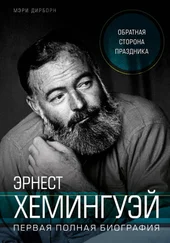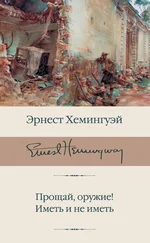“He says he never saw the fellow at all,” the interpreter said. “I tell you straight they shot him in the back.”
“Ask him who shot the Russian.”
“Poor Russian,” said Cayetano. “He was on the floor with his head enveloped in his arms. He started to give cries when they shoot him and he is giving cries ever since. Poor Russian.”
“He says some fellow that he doesn’t know. Maybe the same fellow that shot him.”
“Listen,” the detective said. “This isn’t Chicago. You’re not a gangster. You don’t have to act like a moving picture. It’s all right to tell who shot you. Anybody would tell who shot them. That’s all right to do. Suppose you don’t tell who he is and he shoots somebody else. Suppose he shoots a woman or a child. You can’t let him get away with that. You tell him,” he said to Mr. Frazer. “I don’t trust that damn interpreter.”
“I am very reliable,” the interpreter said. Cayetano looked at Mr. Frazer.
“Listen, amigo,” said Mr. Frazer. “The policeman says that we are not in Chicago but in Hailey, Montana. You are not a bandit and this has nothing to do with the cinema.”
“I believe him,” said Cayetano softly. “Ya lo creo.”
“One can, with honor, denounce one’s assailant. Every one does it here, he says. He says what happens if after shooting you, this man shoots a woman or a child?”
“I am not married,” Cayetano said.
“He says any woman, any child.”
“The man is not crazy,” Cayetano said.
“He says you should denounce him,” Mr. Frazer finished.
“Thank you,” Cayetano said. “You are of the great translators. I speak English, but badly. I understand it all right. How did you break your leg?”
“A fall off a horse.”
“What bad luck. I am very sorry. Does it hurt much?”
“Not now. At first, yes.”
“Listen, amigo,” Cayetano began, “I am very weak. You will pardon me. Also I have much pain; enough pain. It is very possible that I die. Please get this policeman out of here because I am very tired.” He made as though to roll to one side; then held himself still.
“I told him everything exactly as you said and he said to tell you, truly, that he doesn’t know who shot him and that he is very weak and wishes you would question him later on,” Mr. Frazer said.
“He’ll probably be dead later on.”
“That’s quite possible.”
“That’s why I want to question him now.”
“Somebody shot him in the back, I tell you,” the interpreter said.
“Oh, for Chrisake,” the detective sergeant said, and put his notebook in his pocket.
* * * * *
Outside in the corridor the detective sergeant stood with the interpreter beside Mr. Frazer’s wheeled chair.
“I suppose you think somebody shot him in the back too?”
“Yes,” Frazer said. “Somebody shot him in the back. What’s it to you?”
“Don’t get sore,” the sergeant said. “I wish I could talk spik.”
“Why don’t you learn?”
“You don’t have to get sore. I don’t get any fun out of asking that spik questions. If I could talk spik it would be different.”
“You don’t need to talk Spanish,” the interpreter said. “I am a very reliable interpreter.”
“Oh, for Chrisake,” the sergeant said. “Well, so long. I’ll come up and see you.”
“Thanks. I’m always in.”
“I guess you are all right. That was bad luck all right. Plenty bad luck.”
“It’s coming along good now since he spliced the bone.”
“Yes, but it’s a long time. A long, long time.”
“Don’t let anybody shoot you in the back.”
“That’s right,” he said. “That’s right. Well, I’m glad you’re not sore.”
“So long,” said Mr. Frazer.
* * * * *
Mr. Frazer did not see Cayetano again for a long time, but each morning Sister Cecilia brought news of him. He was so uncomplaining she said and he was very bad now. He had peritonitis and they thought he could not live. Poor Cayetano, she said. He had such beautiful hands and such a fine face and he never complains. The odor, now, was really terrific. He would point toward his nose with one finger and smile and shake his head, she said. He felt badly about the odor. It embarrassed him, Sister Cecilia said. Oh, he was such a fine patient. He always smiled. He wouldn’t go to confession to Father but he promised to say his prayers, and not a Mexican had been to see him since he had been brought in. The Russian was going out at the end of the week. I could never feel anything about the Russian, Sister Cecilia said. Poor fellow, he suffered too. It was a greased bullet and dirty and the wound infected, but he made so much noise and then I always like the bad ones. That Cayetano, he’s a bad one. Oh, he must really be a bad one, a thoroughly bad one, he’s so fine and delicately made and he’s never done any work with his hands. He’s not a beet worker. I know he’s not a beet worker. His hands are as smooth and not a callous on them. I know he’s a bad one of some sort. I’m going down and pray for him now. Poor Cayetano, he’s having a dreadful time and he doesn’t make a sound. What did they have to shoot him for? Oh, that poor Cayetano! I’m going right down and pray for him.
She went right down and prayed for him.
* * * * *
In that hospital a radio did not work very well until it was dusk. They said it was because there was so much ore in the ground or something about the mountains, but anyway it did not work well at all until it began to get dark outside; but all night it worked beautifully and when one station stopped you could go farther west and pick up another. The last one that you could get was Seattle, Washington, and due to the difference in time, when they signed off at four o’clock in the morning it was five o’clock in the morning in the hospital; and at six o’clock you could get the morning revellers in Minneapolis. That was on account of the difference in time, too, and Mr. Frazer used to like to think of the morning revellers arriving at the studio and picture how they would look getting off a street car before daylight in the morning carrying their instruments. Maybe that was wrong and they kept their instruments at the place they revelled, but he always pictured them with their instruments. He had never been in Minneapolis and believed he probably would never go there, but he knew what it looked like that early in the morning.
Out of the window of the hospital you could see a field with tumbleweed coming out of the snow, and a bare clay butte. One morning the doctor wanted to show Mr. Frazer two pheasants that were out there in the snow, and pulling the bed toward the window, the reading light fell off the iron bedstead and hit Mr. Frazer on the head. This does not sound so funny now but it was very funny then. Every one was looking out the window, and the doctor, who was a most excellent doctor, was pointing at the pheasants and pulling the bed toward the window, and then, just as in a comic section, Mr. Frazer was knocked out by the leaded base of the lamp hitting the top of his head. It seemed the antithesis of healing or whatever people were in the hospital for, and every one thought it was very funny, as a joke on Mr. Frazer and on the doctor. Everything is much simpler in a hospital, including the jokes.
From the other window, if the bed was turned, you could see the town, with a little smoke above it, and the Dawson mountains looking like real mountains with the winter snow on them. Those were the two views since the wheeled chair had proved to be premature. It is really best to be in bed if you are in a hospital; since two views, with time to observe them, from a room the temperature of which you control, are much better than any number of views seen for a few minutes from hot, empty rooms that are waiting for some one else, or just abandoned, which you are wheeled in and out of. If you stay long enough in a room the view, whatever it is, acquires a great value and becomes very important and you would not change it, not even by a different angle. Just as, with the radio, there are certain things that you become fond of, and you welcome them and resent the new things. The best tunes they had that winter were “Sing Something Simple,” “Singsong Girl,” and “Little White Lies.” No other tunes were as satisfactory, Mr. Frazer felt. “Betty Co–ed” was a good tune too, but the parody of the words which came unavoidably into Mr. Frazer’s mind, grew so steadily and increasingly obscene that there being no one to appreciate it, he finally abandoned it and let the song go back to football.
Читать дальше
Конец ознакомительного отрывка
Купить книгу
